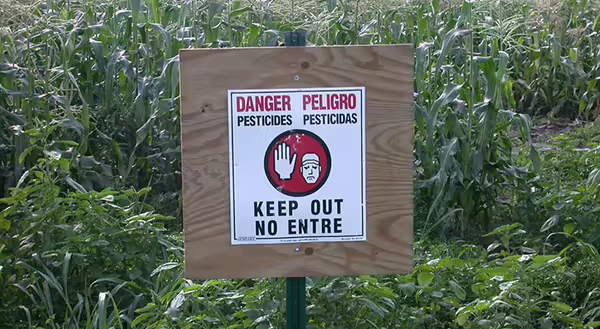
The Worker Protection Standard (WPS) is a regulation intended to reduce the risks of illness or injury resulting from occupational exposures to pesticides used in the production of agricultural plants. WPS requires agricultural employers and commercial pesticide handler employers to provide specific information and protections to workers, handlers, and other persons when WPS-labeled pesticide products are used on agricultural establishments in the production of agricultural plants. Employers are also required to provide annual WPS training to agricultural employees. Are you meeting all the WPS training requirements? As you wrap up the 2023 growing season and prepare for 2024, take some time to review your WPS training procedures.
Do you need to provide pesticide safety training to your employees?
Not all pesticide operations fall under the WPS. If you are unsure, use The Worker Protection Standard: Does It Apply to You? tool produced by the Pesticide Educational Resources Collaborative (PERC), or review the How to Comply With the 2015 Revised Worker Protection Standard For Agricultural Pesticides Manual.
WPS pesticide safety training frequency and exemptions
If WPS applies to your operation, you must provide training prior to a worker entering a treated area on an agricultural establishment, or prior to a handler conducting any handling task. The revised regulation no longer allows a grace period for this training. The regulation also requires pesticide safety training for all workers and handlers on an annual basis.
Certain employees may be exempt from the annual training requirements. Certified pesticide applicators, certified crop advisors, agricultural workers who never enter treated areas within 30 days of pesticide application or within 30 days of the end of a restricted entry interval (REI), and certain members of the establishment owner’s immediate family are not required to complete safety training. Consult the previously referenced “How to Comply” manual for details on each exemption.
WPS training resources for owners and employers in Illinois
Trainers can use any WPS training materials as long as they are EPA-approved. Approved trainings will have an EPA-approval number similar to the following: EPA approval W/H PST 00001. Be sure to select training materials that meet the training requirements for the employee; i.e. worker training, handler training, or training for trainers. In the past, Illinois Pesticide Safety Education Program (PSEP) training clinics qualified for WPS trainings. Unfortunately, we are not able to cover all of the expanded training topics within the short timeframe of our PSEP training clinics. Illinois PSEP currently recommends that trainers utilize training materials published on the PERC website.
Who can conduct the safety training?
The person who conducts the training must be a certified applicator or have completed an EPA-approved train-the-trainer program. The Illinois Department of Agriculture also has the authority to designate approved trainers, such as University of Illinois Extension. The trainer must be present at all times during the training to respond to trainees’ questions. A translator may be necessary to ensure that the information is presented in a manner that the trainees can understand.
Recordkeeping requirements
Training records for each worker and handler must be kept on the establishment for 2 years from the date of training. Training records must include the following information:
- The worker’s or handler’s printed name and signature,
- The date of training,
- Trainer’s name,
- Evidence of the trainer’s qualification to train,
- Employer’s name, and
- Information to identify which EPA-approved training materials were used for the training (i.e., the EPA document number or EPA approval number for the materials)
If requested, the employer must provide a copy of the training record to the employee. These records will also be necessary in the event of a WPS compliance inspection.
ABOUT THE AUTHOR: Travis Cleveland provides subject matter expertise and training in pesticide safety with an emphasis on plant pathology. Provides diagnostic support the U of I Plant Clinic. Coordinates the Home, Yard and Garden Pest Newsletter.